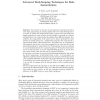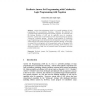88 search results - page 8 / 18 » GrinGo : A New Grounder for Answer Set Programming |
ICLP
2009
Springer
14 years 8 months ago
2009
Springer
Probabilistic logic programs (PLPs) define a set of probability distribution functions (PDFs) over the set of all Herbrand interpretations of the underlying logical language. When...
ECAI
2006
Springer
13 years 11 months ago
2006
Springer
Abstract. In human-like reasoning it often happens that different conditions, partially alternative and hierarchically structured, are mentally grouped in order to derive some conc...
ICSE
2008
IEEE-ACM
14 years 8 months ago
2008
IEEE-ACM
When software developers want to understand the reason for a program's behavior, they must translate their questions about the behavior into a series of questions about code,...
AGP
2003
IEEE
13 years 11 months ago
2003
IEEE
Abstract. The interest in the area of non-monotonic reasoning and declarative logic programming is growing rapidly after the recent development of a number of Answer Set Programmin...
LOPSTR
2009
Springer
14 years 2 months ago
2009
Springer
Answer Set Programming (ASP) is a powerful paradigm of logic programming for non-monotonic reasoning. However, the restriction of “grounded range-restricted function-free normal ...


